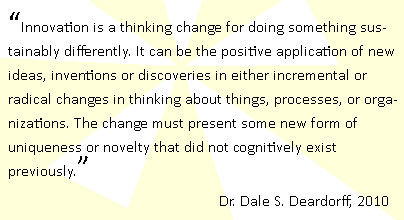


Strategic Innovation Session Description:
The Strategic Innovation RPLC Accelerated Learning Share-Module is a Team and Leader based methodology structured to introduce the key concepts of Innovation and Creativity thru a reading tutorial completed offline prior to a 4 hour facilitated intervention.
The Innovation process challenges an organization to look beyond its established busines boundaries and mental models and to participate in an open minded, creative exploration of the realm of possibilities. Strategic Innovation is the creation of growth strategies, new product ideas, services or business models that can change the enterprise and generate significant new value for your customers, partners and the NTS Corporation.
Strategic innovation can be defined as:
The framework of interdependent content, process and context dimensions that will allow the application of creativity and innovation to strategic management in order to enable strategic differentiation and competitive advantage. This is done by challenging conventional logic and redefining the company’s business model, redrawing market boundaries, creating new markets and value improvements for customers and the company itself.
The Strategic Innovation framework weaves together seven characteristics to produce a portfolio of outcomes that can help drive growth. The dimensions include:
- A Managed Innovation Process
- Strategic Alignment
- Industry Foresight
- Consumer - Customer Insight
- Core Technologies
- Organizational Readiness
- Disciplined Implementation
Strategic innovation leads to either new business, new markets (either by creating new ones or reshaping existing ones) and increased value for both the customer and the company or any combination of these three. The Business world is exponentially dynamic and the challenges of competition are increasing at a faster rate than the growth rate of the technology driven business. More and more companies are gradually operating in different countries and are dependant on tecnology driven business processes in one form or other. The ability to understand and embrace strategic innovations have a critical and decisive impact in terms of determining the overall value, positive growth and development path in the journey to attain new competitiveness.
There are Seven Dimensions of Strategic Innovation:
1st is the Managed Innovation Process covers the sequence of activities from the beginning of an initiative through implementation combining traditional and non-traditional approaches to Business Strategy. The Innovation process is divided into two modes of thinking: Divergent and Convergent.
2nd is Strategic Alignment which is the process of engaging a short term leadership team, a broad cross section of the organization and key external stakeholders in the developments of a shared vision and the path forward.
3rd is Industry Foresight which is a top- down approach that explores the drivers, trends, enablers and dislocations within one or more industries. With this step an organization can develop a compelling, proprietary view of the future, enabling it to then define well grounded and pragmatic participation strategy.
4th is the Consumer - Customer Insight is a qualitative, bottom up approach that leverages insights into the behavior’s, perceptions and needs of the current and potential consumers / customers by involving them as true partners in the innovation process.
5th are the Core Technologies - After having a clear idea of a Customers needs it is not only essential to consider the key organizational technologies but also other capabilities that are integral to success. Such competencies include intellectual property or patents, unique relationships with key supplier and partners, brand equity, speed and operational agility or unique business process.
6th is the Organizational Readiness - Its importance in the innovative or convergent stage. It primarily refers the organizations ability to act upon and implement innovative ideas and strategies to acknowledge the operational, political, cultural and financial demands that will follow.
7th is the Disciplined Implementation which includes the transition to specific projects or programs, technical product development and design, developing a distinctive value proposition organizational buy-in.
For more information on cost and event booking, email RPLC
